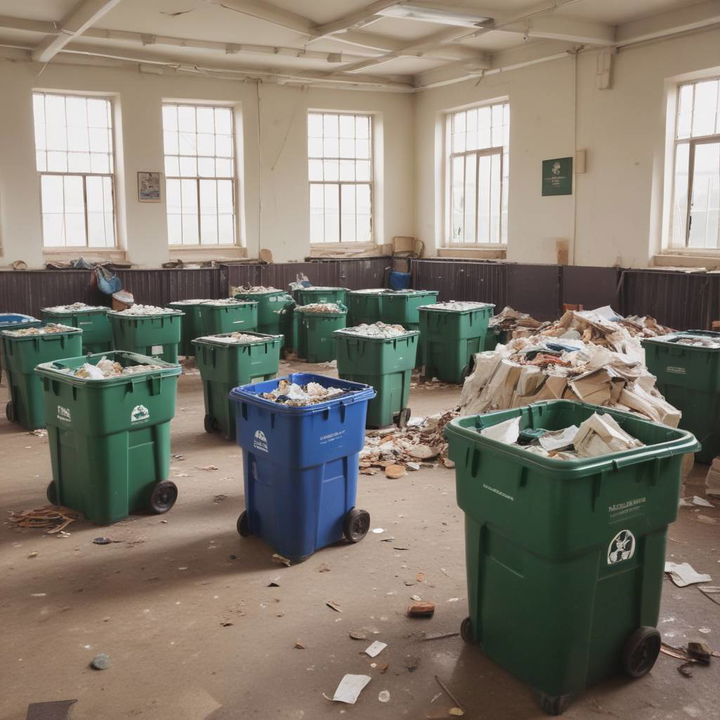Educational institutions, from primary schools to universities, play a pivotal role in shaping the future. They are not only centers of learning but also influential entities that can model sustainable practices. Waste management is a critical area where educational institutions can significantly impact. Proper waste management strategies are essential for maintaining a clean and healthy environment, promoting sustainability, and educating future generations about environmental responsibility.
Effective waste management is crucial for various reasons. It helps reduce institutions’ environmental footprint, saves costs in the long run, and fosters a culture of sustainability among students and staff. To achieve these goals, schools and universities must adopt comprehensive waste management plans that include recycling, composting, and efficient waste disposal. In cities like Atlanta, educational institutions can benefit greatly from services like Atlanta dumpster rentals, which provide convenient and efficient waste management solutions.

Reducing Environmental Footprint
Thus, it is crucial to take proper measures to manage waste generated in educational institutions since one of the aims is to minimize the impact of such institutions on the environment. This waste emanates from paper used to produce books, writing materials, plastics, food that students and staff consume, and electronic gadgets like computers used in learning institutions. If not managed appropriately, this waste becomes a source of pollution and pollution of the environment.
The following are the key areas through which institutions can reduce the amounts of waste that they discharge to landfills. This is where programs such as recycling, for instance, are essential since they can go a long way towards reducing the amount of paper, plastics, and metals, among other things, that end up as waste. For instance, food waste and yard waste can be composted to produce helpful compost that can be used again in schools to enhance the growth of plants in school gardens and other green areas.
In addition, educational institutions can be a model for the rest of the communities regarding their sustainable practices. Thus, if students, staff, and faculty of the institution notice that their institution is concerned about the proper disposal of waste, they are equally likely to follow those practices in their daily lives. This ‘trickle down’ effect can increase the participation of other members in the community in improving their sustainable practices and thus help make the environment cleaner and healthier.
Cost Savings and Resource Efficiency
Two essential facts stress the importance of proper waste management: the problem’s ecological aspect and the process’s economic profitability. By managing the waste generated in educational institutions, the institutions can reduce the amount of waste that they have to dispose of, thus cutting on the cost of waste disposaWhenhen implemented in institutions, these services can assist in cutting costs of waste disposal by avoiding the dumping of waste and the need for more frequent waste collection.
Besides saving costs, appropriate waste management also assists in efficiently using resources. A number of materials are regarded as waste products but can actually be recycled for use again, such as newspapers, cardboard, plastics, etc. This makes it possible for institutions to cut their demands for raw materials and, in the process, protect natural resources. It also assists the public in being environmentally conscious and contributes to the circular economy in which items are utilized and recycled.
The reduction of waste also has the potential to improve resource productivity. Another benefit that can be obtained from implementing waste reduction strategies is resource utilization efficiency. For instance, through waste audits, institutions of learning will be able to establish where they can cut on their waste. This might include measures to lower paper consumption, for example, if an organization begins to send emails instead of faxes, which requires printing on both sides of a sheet of paper, or reduces the amount of food wasted in canteens by serving rational portions.
Fostering a Culture of Sustainability
For this reason, educational institutions play a critical role as they have a chance to shape the minds of future generations. By making waste management part of the curriculum and campus culture, schools and universities can inform children and students of the significance of sustainability and the necessity of preserving the environment.
Guest lectures or field trips can be organized in which students are involved in waste management activities like recycling, composting, and waste audits to promote sustainability. These activities can also instill a culture of responsibility in students, allowing them to play an active role in protecting the environment.
In addition, campuses of educational institutions can serve as examples of how sustainability can be implemented by applying sustainable practices. Schools and universities, therefore, have a critical role in Sustainable Practices by implementing demonstration projects that include energy-efficient buildings, water conservation measures, and waste reduction initiatives. This can serve as a model for the students, staff, and visitors of such a facility to emulate in their own lives.
Moreover, these sustainability initiatives can be integrated into various academic disciplines, providing a multidisciplinary approach to environmental education. For example, science classes can explore the ecological impact of waste, while economics classes can analyze the cost-benefit aspects of recycling programs. Art classes can even get involved by creating projects from recycled materials, highlighting the creative possibilities of repurposing waste. This holistic approach ensures that sustainability is not seen as a standalone subject but as an integral part of various fields of study.
Collaborative projects between departments can further enhance the culture of sustainability. For instance, the environmental science department could partner with the facilities management team to conduct a campus-wide waste audit, identifying critical areas for improvement. Students could then present their findings and recommendations to the administration, gaining practical experience in environmental management and advocacy.

Conclusion
Proper waste management cannot be overemphasized because of its effects on the environment, financial implications, and the need to inculcate sustainable practices in institutions. With the help of integrated waste management initiatives, schools and universities can reduce their environmental impacts, enhance resource productivity, and create awareness of sustainable development among the young generation.
In cities such as Atlanta, where waste management services like Atlanta dumpster rentals are available, educational institutions have all the necessary resources to do the right thing with waste. Suppose these services are utilized, and academic institutions are committed to embracing sustainable development. Academic institutions are vital in attaining a cleaner and sustainable future for everyone.




